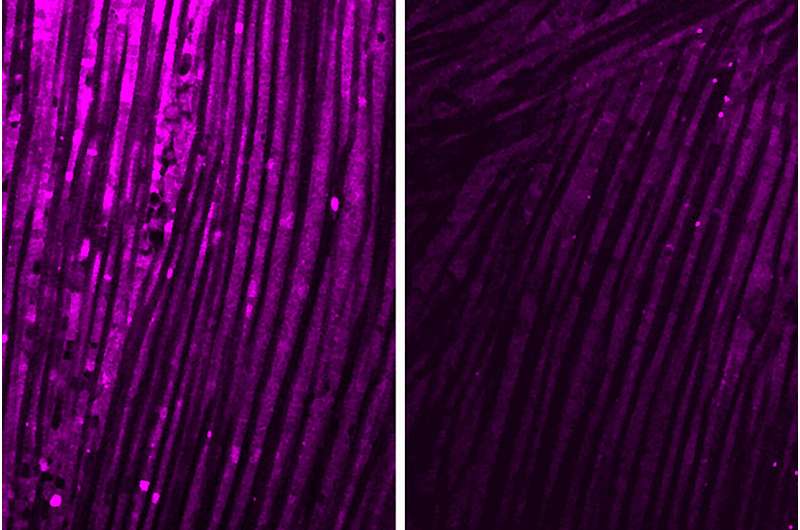This article has been reviewed according to Science X's editorial process and policies. Editors have highlighted the following attributes while ensuring the content's credibility:
fact-checked
peer-reviewed publication
trusted source
proofread
Scientists identify possible way to block muscle fatigue in long COVID, other diseases

Infections and neurodegenerative diseases cause inflammation in the brain. But for unknown reasons, patients with brain inflammation often develop muscle problems that seem to be independent of the central nervous system. Now, researchers at Washington University School of Medicine in St. Louis have revealed how brain inflammation releases a specific protein that travels from the brain to the muscles and causes a loss of muscle function.
The study, in fruit flies and mice, also identified ways to block this process, which could have implications for treating or preventing the muscle wasting sometimes associated with inflammatory diseases, including bacterial infections, Alzheimer's disease and long COVID.
The study is published July 12 in the journal Science Immunology.
"We are interested in understanding the very deep muscle fatigue that is associated with some common illnesses," said senior author Aaron Johnson, Ph.D., an associate professor of developmental biology.
"Our study suggests that when we get sick, messenger proteins from the brain travel through the bloodstream and reduce energy levels in skeletal muscle. This is more than a lack of motivation to move because we don't feel well. These processes reduce energy levels in skeletal muscle, decreasing the capacity to move and function normally."
To investigate the effects of brain inflammation on muscle function, the researchers modeled three different types of diseases—an E. coli bacterial infection, a SARS-CoV-2 viral infection and Alzheimer's.
When the brain is exposed to inflammatory proteins characteristic of these diseases, damaging chemicals called reactive oxygen species build up. The reactive oxygen species cause brain cells to produce an immune-related molecule called interleukin-6 (IL-6), which travels throughout the body via the bloodstream.
The researchers found that IL-6 in mice—and the corresponding protein in fruit flies—reduced energy production in muscles' mitochondria, the energy factories of cells.
"Flies and mice that had COVID-associated proteins in the brain showed reduced motor function—the flies didn't climb as well as they should have, and the mice didn't run as well or as much as control mice," Johnson said.
"We saw similar effects on muscle function when the brain was exposed to bacterial-associated proteins and the Alzheimer's protein amyloid beta. We also see evidence that this effect can become chronic. Even if an infection is cleared quickly, the reduced muscle performance remains many days longer in our experiments."
Johnson, along with collaborators at the University of Florida and first author Shuo Yang, Ph.D.—who did this work as a postdoctoral researcher in Johnson's lab—make the case that the same processes are likely relevant in people.
More information: Shuo Yang et al, Infection and chronic disease activate a systemic brain-muscle signaling axis, Science Immunology (2024). DOI: 10.1126/sciimmunol.adm7908. www.science.org/doi/10.1126/sciimmunol.adm7908




















